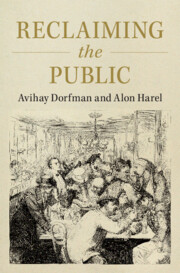Book contents
- Reclaiming the Public
- Reclaiming the Public
- Copyright page
- Dedication
- Contents
- Acknowledgments
- Introduction
- 1 A Public Conception of Political Authority
- 2 Law as Standing
- 3 Speaking in a Different Voice
- 4 Inherently Public Goods
- 5 Against Privatization as Such
- 6 Public Ownership
- 7 Why Not Artificial Intelligence?
- Concluding Remarks
- Index
2 - Law as Standing
Published online by Cambridge University Press: 22 February 2024
- Reclaiming the Public
- Reclaiming the Public
- Copyright page
- Dedication
- Contents
- Acknowledgments
- Introduction
- 1 A Public Conception of Political Authority
- 2 Law as Standing
- 3 Speaking in a Different Voice
- 4 Inherently Public Goods
- 5 Against Privatization as Such
- 6 Public Ownership
- 7 Why Not Artificial Intelligence?
- Concluding Remarks
- Index
Summary
This chapter addresses a basic question of general jurisprudence, that is, what difference law makes in moral space. It argues that a central characteristic of law is not necessarily that it tells us what morality (or justice) might dictate. Rather, it establishes a way of attributing decisions to all of us and not to any one of us in particular. Law’s distinctive moral virtue is not justice but legitimacy. What renders this possible is the operation of public officials whose value lies in acting in our name. The chapter defends what we label the standing conception of law, according to which law’s most basic moral contribution is that of establishing an entity whose normative pronouncements could count as being made in the name of (or even by) the people.
Keywords
- Type
- Chapter
- Information
- Reclaiming the Public , pp. 41 - 63Publisher: Cambridge University PressPrint publication year: 2024

